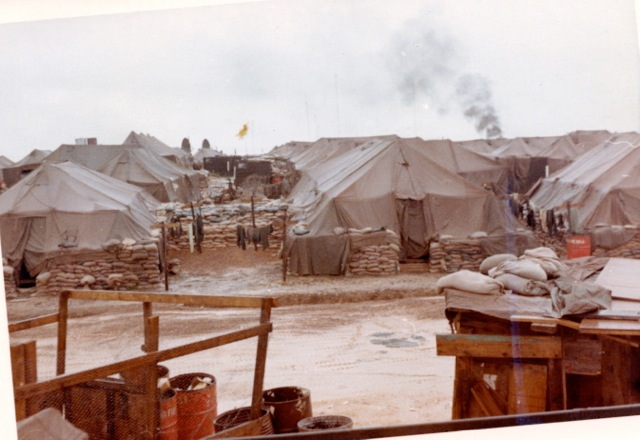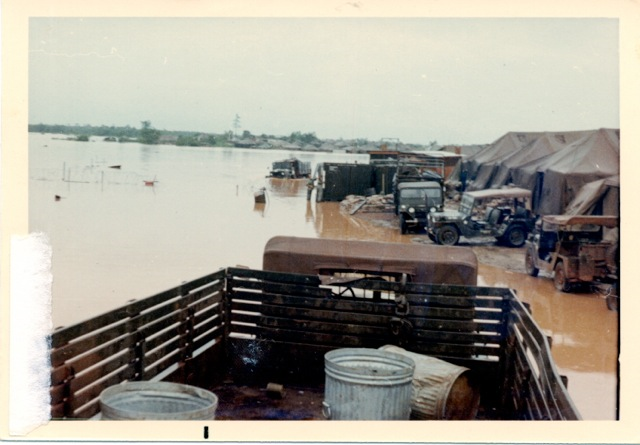Hank Neil's Recollections of Quang Tri
1146, 14 Jul 2014Quoted below is an email between Hank Neil and John Medley, providing some historical insights into Finance operations in Vietnam.
John,
I bought your book, read your book and enjoyed your book! It brought back many memories of people, places and procedures (Iron Triangle, etc.). Of course I was familiar with many of the people and places you wrote about and that made reading your story interesting.
Congratulations on you accomplishments and for taking the time to document your military and post military life. I find writing a bit of a challenge but in recent years have written a few short stories of my time in the Army, mostly of my time in Vietnam. I was there with the 1st Infantry Brigade, 5th Infantry Division (Mech). We were the last major unit to go to Vietnam (sumer of '68) and were the northernmost Army unit as we were located in northern Quang Tri Province along the DMZ where we were attached to the Third Marine Division. I was a young Captain and had a 30 man Finance Sections but after a few months the powers that be in Saigon decided I should also provide service to all non-divisional troops in our AO. That meant I ended up serving about 12,000 troops. They activated an Army National guard Finance Section and attached it to me as a Class B agent activity located about a mile away. Interestingly, my section operated under the Centralized Military Pay System (CAMPS) while the National Guard unit operated under the manual system. Of course the Marines had their own system.
Before I got orders to Vietnam I had been working in the Finance Center in the CAMPS branch. At the time there were about 140,000 pay accounts under CAMPS, with the 1st Cavalry being the largest individual unit under the then new system. However, the few CAMPS units in Vietnam were converted to the system while in Vietnam. It was explained to me that they wanted to test what would happen if they deployed a unit under the new centralized pay system. Prior to serving in USAFAC I had been a Lieutenant in the garrison F&AO at Fort Carson and that was one of the two original test sites for the Centralized Pay System (CAPS) which as you know, was the forerunner of CAMPS. I was about to conclude my time in the Army after having served a little over four years, two as an enlisted cryptographer in the Army Security Agency in Turkey and a little more than two in the F&AO, Fort Carson,CO. MG Haneky and COL Warren Lamb came out to Fort Carson to see how CAPS was doing and to talk to me about staying in the Army and serving at USAFAC. They wanted someone who knew how CAPS worked in the field to join the team at USAFAC as they were about to take the system to the next level, i. e., CAMPS. I said OK and moved to indianapolis.
Then, on a cold winter evening in early 1968, COL Gerald Quinlan, Deputy CO, USAFAC (if I remember correctly), asked me to come to his office. When I went there he proceeded to tell me I was on orders to Vietnam. Being young and single I thought this would be a great adventure. He then said I was to return to Fort Carson to form a new Finance Section to support the 1st Bde, 5th Inf (M) which would be a new brigade as they were only transferring the brigade's flag and would staff the brigade with all new personnel. He also said the Finance Section would operate under CAMPS as they wanted to test how things would go during a deployment. I was to form the Finance Section, train it and deploy it to northern I Corps with the brigade and would then rely on the military postal system to transmit all pay change data to USAFAC for key punching and computing. Error listings, payrolls, etc. would be returned to me via the mail. Of course at the time I did not have a clue how austere our operating conditions would be in Vietnam:

Finance "Office" at Quang Tri Combat Base.

Typhoon flooding which delayed mail.
nor how slow and at times unreliable the military postal system was between northern Quang Tri and Indiana. So, off I went to Fort Carson ready to go to war.
I won't bore you with the rest of the story other than to say when I got to Fort Carson the entire new Finance Section contained one Captain (me), one 1st Lt, two desks and two chairs located in an old WWII barracks building! Shortly after the LT and I were joined by an AG Warrant Officer, three Staff Sergeants and five or six school trained Finance clerks. I quickly set off to see the AG SGM who I knew from my earlier assignment to Fort Carson and explained my situation to him. He was involved in the in processing of the 5,000 or so new bodies who were to staff the brigade and assisted me getting soldiers who had some education or experience in Finance or Business. After interviewing the young troops he sent me, all just out of basic and AIT, and explaining to them I'd like to make them Finance clerks I soon filled my Finance Section. We then conducted a mini Finance training course utilizing the skills of our meager staff of officers and NCOs. A few months later we deployed to Vietnam, lived on the Marine's Quang Tri Combat Base for about three months while building our own Camp Red Devil, successfully completed an MPC conversion day and got the National Guard section up to snuff. Oh yes, we somehow made CAMPS work while dealing with slow mail, typhoons, and the rigors of life in a combat zone. Like all troops in combat units we successfully defended ourselves and survived. It was an interesting year and reading your book may inspire me to document some of the more memorable moments. I'm still in touch with about half of the soldiers who deployed to Vietnam in our section and meet with some of them each year at the Society of the Fifth Divisions annual reunion. We are close friends to this day.
Again, I enjoyed your book and am impressed with the work you did to write it and to see it through publication. Well done!
I don't think I will get to the reunion in Baton Rouge this fall as we have some scheduling conflicts in addition to hosting Tony and Cathy Renfrey. You may remember Tony as the British Exchange Officer at USAFAC while I was Commandant of the school in the late 80s. They are coming over to see the fall colors in Vermont where Judy and I have a condo.
Best wishes,
Hank
(if you wish to post a comment on this bulletin, please log in)
